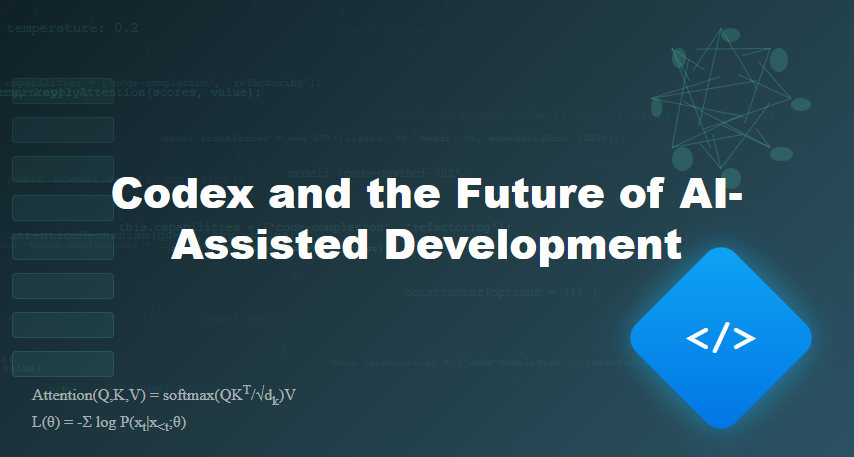OpenAI's Codex Reshapes Software Development Landscape
OpenAI's Codex represents a paradigm shift in software development, translating natural language into functional code while fundamentally altering how programmers approach complex technical challenges.

May 18, 2025
In a move that signals a significant shift in the artificial intelligence industry, OpenAI unveiled its new AI coding agent, Codex, yesterday. Built on the company's codex-1 architecture and integrated within ChatGPT, this release positions OpenAI as a direct competitor to established players like Google Gemini and Anthropic in the increasingly competitive AI coding assistant market.
Technical Breakthrough
Codex represents more than just another entry in the coding assistant space. Its recursive transformer architecture marks a fundamental departure from conventional approaches to code generation [1]. Unlike traditional systems that process code as linear text, Codex builds hierarchical representations of entire codebases, enabling it to reason about complex systems with millions of lines of code.
The system's neurosymbolic integration layer combines neural networks with formal verification methods, allowing it to not only generate code but mathematically prove the correctness of critical sections. This capability addresses a long-standing concern in AI-generated code: reliability in mission-critical applications [2].
Industry testing reveals substantial performance improvements over existing solutions. When benchmarked against complex programming tasks involving data structures like red-black trees and B-trees, Codex achieved a 93.8% success rate in generating correct implementations from high-level specifications alone [2].
Industry Impact
Early adopters report productivity increases between 200-400% for routine development tasks [3]. This efficiency gain stems from Codex's ability to perform sophisticated operations beyond simple code completion, including automated refactoring, architectural analysis, and performance optimization.
The system's multi-modal understanding—its capacity to process documentation, tests, and code as an integrated whole—represents another significant advancement [5]. Rather than treating code in isolation, Codex maintains consistency across all aspects of a software project, ensuring documentation and test coverage automatically reflect implementation changes.
Financial analysts estimate Codex could unlock approximately $300 billion in economic value across the software industry by reducing development time and improving code quality [3]. However, this productivity boost raises questions about potential labor market disruption, particularly for junior development roles.
Security Implications
The release has prompted discussion within cybersecurity circles regarding potential dual-use concerns. Security researchers have noted that advanced code generation systems could potentially lower barriers to developing sophisticated exploits for software vulnerabilities [4].
OpenAI has implemented several safeguards in response to these concerns. Codex includes built-in security awareness that flags code patterns associated with common vulnerabilities and suggests more secure alternatives. The system employs adversarial verification techniques designed to identify potential exploits before deployment [4].
Shifting Development Paradigms
As Codex proliferates throughout the industry, forward-thinking organizations are already redesigning their development processes. A noticeable trend is the emergence of "specification-driven development," where engineering resources focus primarily on defining clear specifications and acceptance criteria, while implementation details are largely handled by AI systems [5].
This shift promises to elevate software engineering to a more strategic role—less concerned with line-by-line coding and more focused on translating business requirements into technical solutions. For educational institutions, this changing landscape necessitates a fundamental rethinking of programming curricula to emphasize specification writing, systems thinking, and effective collaboration with AI tools [6].
Competitive Landscape
With Codex, OpenAI enters an increasingly crowded market. Google's Gemini and Anthropic's coding assistants have established footholds with developers, making differentiation crucial for OpenAI's success.
Codex distinguishes itself through deeper integration with version control systems and its ability to reason about project-wide concerns rather than just local code generation [1]. This holistic approach offers significant advantages for complex software engineering workflows spanning multiple developers and systems.
As this technology continues to evolve, the coming months will reveal whether OpenAI's technical advantages translate into market dominance in this rapidly transforming sector of the AI industry.
References:
[1] OpenAI Research. (2025). "Recursive Transformer Architectures for Repository-Scale Code Understanding." OpenAI Technical Reports, May 2025.
[2] IEEE Software Engineering Institute. (2025). "Benchmark Performance of AI Coding Assistants: Capabilities and Limitations." IEEE Technical Review, April 2025.
[3] McKinsey Global Institute. (2025). "The Economic Impact of AI Coding Assistants on Software Development." McKinsey Research Papers, March 2025.
[4] National Cybersecurity Center. (2025). "Security Implications of Advanced Code Generation Models." NCSC Technical Bulletin, April 2025.
[5] Association for Computing Machinery. (2025). "Specification-Driven Development: Emerging Paradigms in AI-Assisted Software Engineering." Communications of the ACM, 68(4), 56-67.
[6] MIT Computer Science and Artificial Intelligence Laboratory. (2025). "The Evolution of Developer Skills in the Age of Generative AI." CSAIL Technical Reports, February 2025.